I have had the privilege of involvement with many of our fire rescue service groups: local emergency medical services (EMS) and training groups, state regional groups such as the South Florida Local Emergency Planning Committee and State Emergency Response Commission, and the hazmat committee of the International Association of Fire Chiefs. A common thread within every level of our industry is the call for leadership.
Next-Gen Leaders Needed!
In the hazardous materials world, the elders who developed the hazmat programs as we know them today are vocal in their expectations. They paid their dues, laid the groundwork, and want hazmat leaders to take this specialty to the next level. I remember having a conversation with one of my hazmat mentors, a true hazmat guru, who laid it out pretty simply: “We need the next leaders in hazmat to step up!” It was not a suggestion; it was an order! One chief I know who regularly presents at hazmat conferences always co-presents with an up-and-coming team member—a brilliant way to start empowering the next generation of leadership!
In EMS (with which I am now heavily involved), it’s the same thing, with innovations such as community paramedicine and mobile integrated health care and new technology on our trucks. The EMS community is calling for leaders to take us into the next generation.
The Importance of Lessons Learned During Training
10 Things Every New Training Chief Should Know
In the training and education subcommittee I recently chaired, the entire group was polled and asked what we should focus on for future training. Virtually every department in Broward County resoundingly responded: leadership and officer development. Every facet of our field is calling for leadership!
Many in our fire rescue service are aware of the need for leadership and developing our profession’s future. We see this at conferences such as FDIC International, on webinars and Humpday Hangouts, and through reading the multitude of fantastic articles in Fire Engineering and other trade magazines in print and online.
Unfortunately, many times it takes a back seat to other priorities; the walk doesn’t necessarily match the talk. Think about the training that your organization provides. Where is the focus? When was the last class on leadership? How is the content delivered? Are there local opportunities to take classes/seminars/workshops focused on fire service leadership?
This is an observation, not a hit on any group. In some cases, there is simply no time. In others, the money and resources needed for a proper in-person leadership class or officer development program is not available or not budgeted. Leadership training often falls into the “we would like to but” category rather than the “we must do it” category. I recently taught a three-day leadership workshop for a central Florida fire rescue department. It was refreshing to see a group that not only preached the need for leadership but acted on it by holding a leadership workshop.
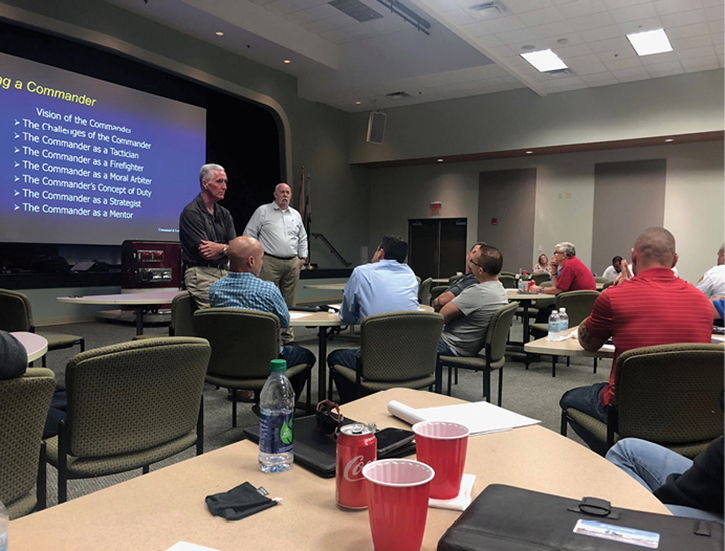
(1) (Left to right) Fire Engineering Editor in Chief Bobby Halton and Fire Department of New York Captain (Ret.) Mike Dugan teach as veteran Miami-Dade (FL) Fire Rescue Captain Bill Gustin (in red shirt, far right front) takes notes. (Photos by author.)
Developing Leaders
In The 21 Irrefutable Laws of Leadership, John Maxwell writes that, if you want succession in your organization, you must go beyond developing yourself and your team; you must develop those around you into the future leaders of your agency. He calls this the “Law of Explosive Growth.” I find myself dwelling on this more than ever in my journey as a fire rescue professional. We have no problem developing ourselves, and we love even more developing our teams and working with amazing people who provide value to the various institutions we are involved with. But have we been developing leaders? I admit that though I take pride in self-development and team building, I haven’t been as intentional about developing future leaders as much as I could have.
When I was awarded the rank of Eagle Scout in the Boy Scouts, part of the ceremony included the “Eagle Charge,” which made crystal clear that I had an expectation to live up to, that my journey had not ended but had only begun. I watch and rejoice as my mentors in every field in which I participate reach retirement. I appreciate tremendously the opportunities I have had to learn something from each of them. Others, unfortunately, have passed away, which always leads me to consider, “Did I learn from them as much as I should have?” Though our mentors, coaches, and those we hold in high regard may not say it, we should understand that those who have paved the way for us to enjoy and thrive in our teams demand that we carry on and lead these groups into the future. Furthermore, they demand that we not only build these teams but create more leaders.
Let’s circle back to Maxwell’s Law of Explosive Growth. Most of us have no issues with personal growth. Seminars, conferences, workshops, degree programs—these are all available to us, and most of us take advantage of them. Reading this article and others like it proves that you are working toward individual growth! As a result of the Covid-19 pandemic, multiple webinars, online training conferences, and other content have become available, often free or at a significantly reduced price. Some are classes that we want to take and others are classes that we need for promotions and advancements. Some fit both categories. The fact that most of our agencies offer some sort of financial reimbursement makes it that more attractive to go and get educated! As leaders, we all need to continue to grow and continue to learn. Being a student of the fire service never stops! Have you ever seen Captain Bill Gustin of Miami-Dade (FL) Fire Rescue at a class or seminar? He’s in the first row, taking notes in that little red notebook. Forty-plus years and he’s taking notes as if he were brand-new on the job! Continue to learn and model this leadership trait (photo 1).
Team Building
Firefighters love to be a part of a team! We start off in the fire service—a team like no other. We become indoctrinated into an organization with a history, a pride, and a duty to serve that is unmatched anywhere else. We begin to explore and become a part of other fire service internal teams and subcultures along our journey. It may be a particular firehouse; an extrication, advanced life support (ALS), or rapid intervention team (RIT) competition team; a technical rescue or hazmat specialty team; or a softball or basketball team. It could just be the department members who all live in a certain neighborhood or community. We’re easy to spot; look for the trucks with the Maltese crosses in our rear windows! These teams give us strength when the road gets rough and provide shelter and solace when we need protection. Continue to build and maintain your teams, like the Fort Lauderdale (FL) Fire Rescue (FLFR) RIT Competition team (photo 2) and the FLFR ALS Competition team (photo 3).
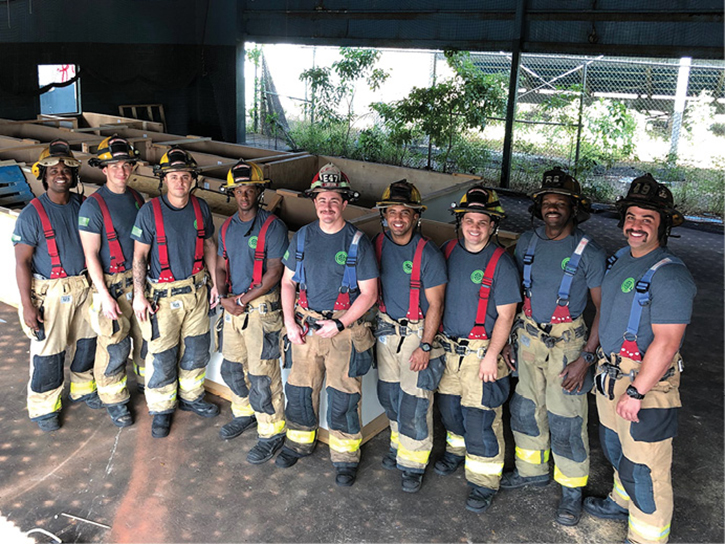
(2) The FLFR RIT Competition team.
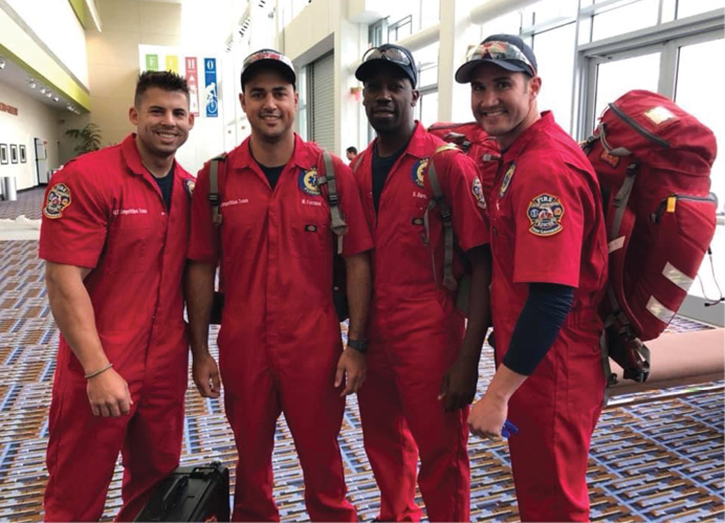
(3) The FLFR ALS Competition team.
To grow leaders, we need to take a moment. Think about a team that you are a part of and think about yourself as a team member. Think about your role on that team and look into the future. Are you being groomed for the next challenge, the chance to step up or advance into other positions? Are your superiors delegating tasks to you, trusting you to take other team members’ responsibilities while they are off or away, or does time stop when they are gone? If you answered no to any of these, and you desire to be a part of your agency’s future, this is your wake-up call! Speak to your officers or superiors; have those tough conversations. Ask for more responsibility; verbalize that you are ready and excited to do your part to lead your agency and your team! The more you open the doors, the more opportunity will find you. You will be surprised what you get when you simply ask.
It’s What You Do
As a team leader, ask yourself similar questions: Am I grooming my team to take on leadership roles? Am I communicating clearly? Am I properly delegating tasks? Is the structure I set forth maintained while I am away? Am I allowing those under my watch to teach, instruct, and educate those around them? Am I exhibiting the right behaviors and traits that I know are those of a leader? What you do, not what you say, is what they will see. If you find yourself responding “no” to these questions, you must reset your perspective and your focus.
So, how am I practicing what I preach? In my agency, I am the unofficial competition team coordinator. I help coordinate, support, and administer the various competition teams (RIT, ALS, and hazmat). Budgeting, scheduling, finding funding mechanisms, begging for conference leave—it isn’t simple. Why do I do it? I don’t get an extra stipend, compete with them, or get pictured with them when they win.
So why do I do it? Because in these teams, I have found some of the most dedicated, talented, driven, and humble individuals in our fire rescue department. These are our future leaders. I was always told to surround myself with great people, and I found many of them in one place! They keep me young; they keep me driven; and although they don’t realize it, they lead up the chain and inspire me. In turn, I support them.
One example is having members of the RIT Competition team co-teach classes with me, such as a recent class on overhead door forcible entry using rotary saws. They’ve taken the class enough times and demonstrated competency enough to take the next step in helping pass on that information to others. Just like my hazmat mentor whom I mentioned earlier, I am now giving them every chance I can to lead. I am doing my part to make sure the walk matches the talk (photos 4, 5).
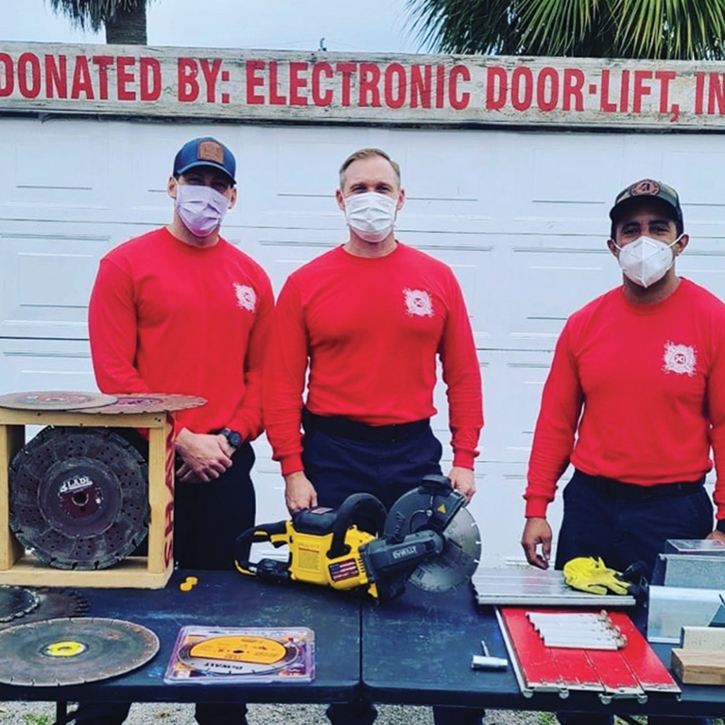
(4) I (center) co-teach with two members of the FLFR RIT Competition team.
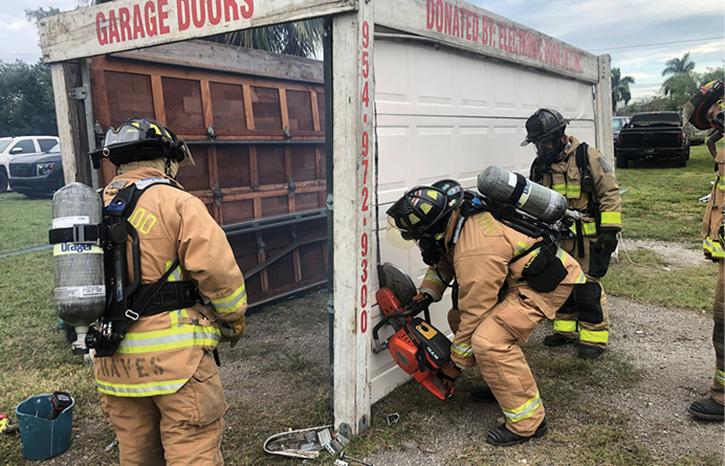
(5) One firefighter coaches another firefighter as he finishes one of his cuts on this sectional garage door.
Our fire rescue service is calling for leadership. Regardless of how this call to action is being made, it is there in every facet of our profession. Sometimes it is loud and verbal, and sometimes it is implied. Beyond developing ourselves and our teams, we need to start developing the leaders within those teams who will take our places as we move on, promote, and eventually enter into retirement. How are you preparing our future leaders today?
Reference
Maxwell, J. C. (2007). The 21 Irrefutable Laws of Leadership: Follow them and people will follow you (10th Anniversary Edition). Nashville, TN: Thomas Nelson.
STEPHEN F. SHAW JR. is a 26-year veteran of the fire rescue service and is the assistant chief for training, EMS, and special projects and hazmat team coordinator for Fort Lauderdale (FL) Fire Rescue. He is an accredited chief fire officer, the chair of the EMS subcommittee for the Broward County Fire Chiefs Association, and vice chair of the South Florida Local Emergency Planning Committee. Shaw is an IAFC hazmat committee member and a hazmat specialist for US&R South Florida Task Force 2 (FL-TF2). A Fire Engineering author and Humpday Hangout participant, he has presented at multiple conferences on topics including leadership, officer development, EMS, and training.

